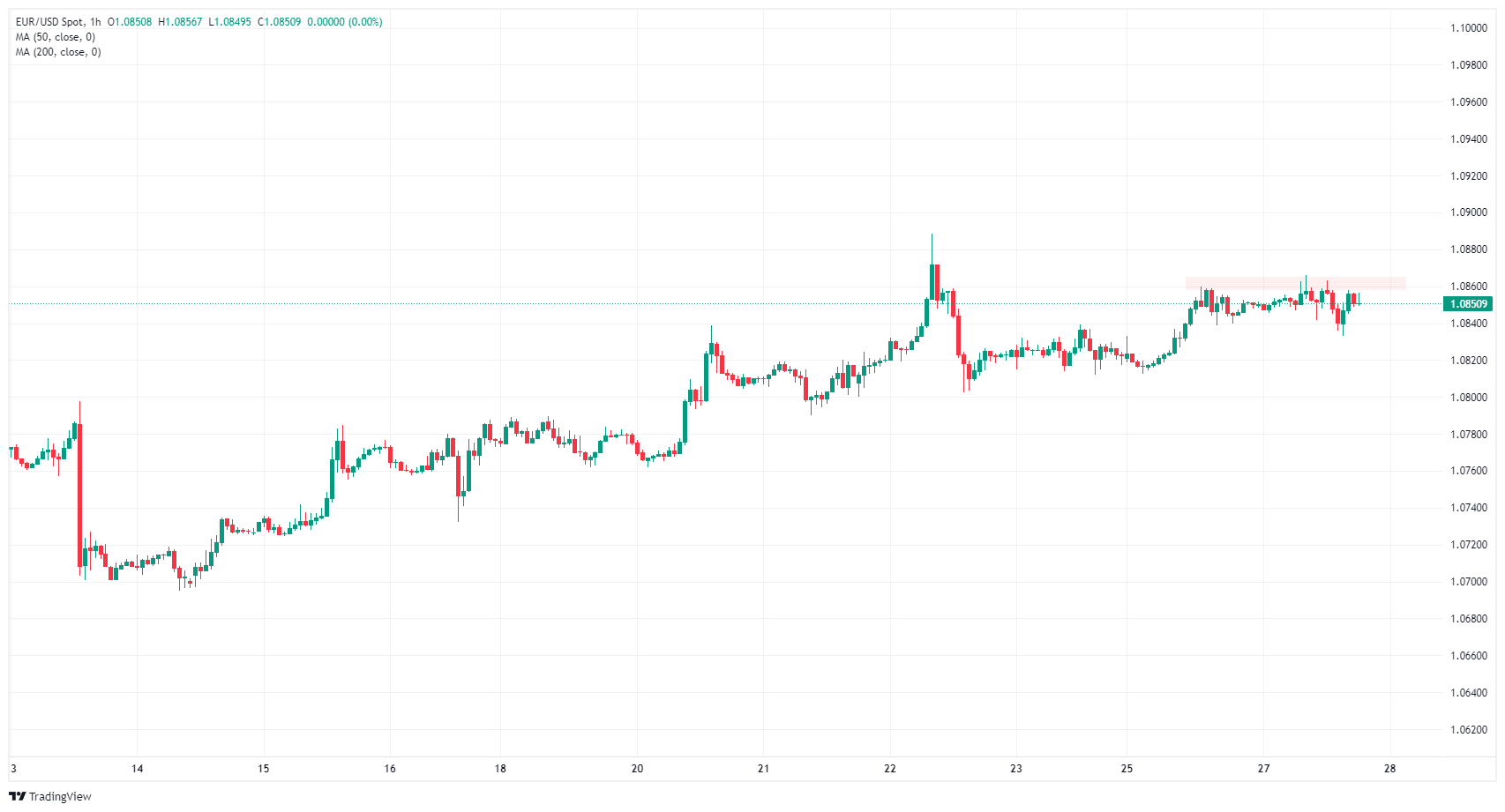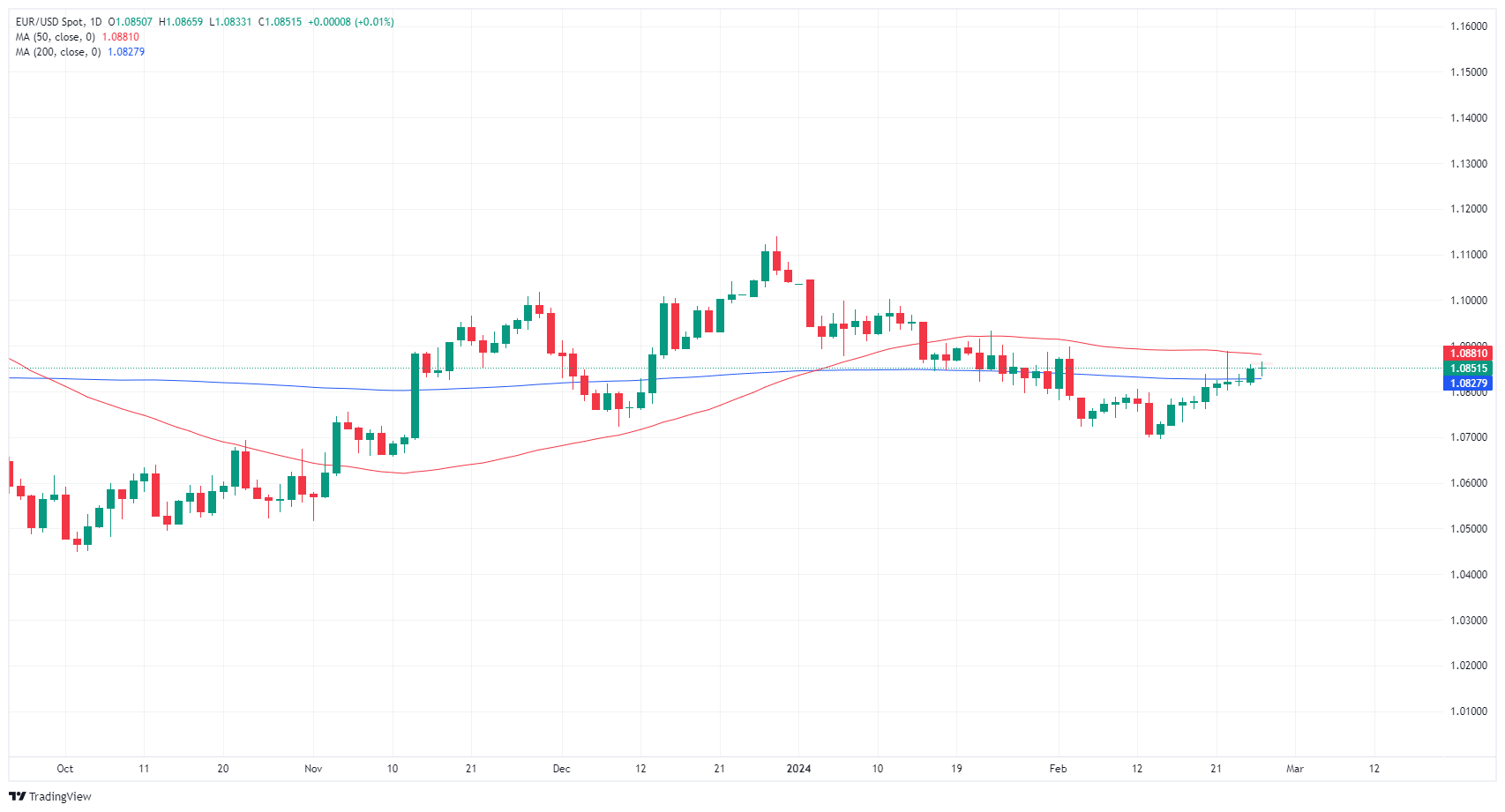- Аналітика
- Новини та інструменти
- Новини ринків
- EUR/USD continues sideways grind near 1.0850 on Tuesday
EUR/USD continues sideways grind near 1.0850 on Tuesday
- EUR/USD consolidates as markets await key US data.
- US Durable Goods Orders declined more than expected.
- US GDP on Wednesday, German CPI inflation on Thursday.
EUR/USD remains strung along the middle near 1.0850 after Tuesday brought little to push the pair in either direction after US Durable Goods Orders declined further than forecast in January. Markets await the latest Gross Domestic Product (GDP) figures from the US on Wednesday.
German Retail Sales and Consumer Price Index (CPI) inflation is slated for Thursday, followed by the US Personal Consumption Expenditure Price Index (PCE) inflation print.
Daily digest market movers: EUR/USD drifts ahead of GDP and inflation figures
- US Durable Goods Orders printed at -6.1% in January, down from the -4.5% forecast compared to the previous month’s -0.3%.
- Germany’s Gfk Consumer Confidence Survey for March came in at the expected -29.0, recovering slightly from the revised previous -29.6.
- US GDP is expected to remain at 3.3% for the annualized fourth quarter on Wednesday.
- Thursday’s German Retail Sales are forecast to print at -1.5% versus the previous -1.7%.
- Germany’s CPI inflation for the year ended February is expected to print at 2.6% versus the previous 2.9%.
- US Core PCE inflation is expected to decrease slightly to 2.8% from the previous 2.9%.
Euro price today
The table below shows the percentage change of Euro (EUR) against listed major currencies today. Euro was the strongest against the Canadian Dollar.
| USD | EUR | GBP | CAD | AUD | JPY | NZD | CHF | |
| USD | -0.03% | -0.02% | 0.13% | -0.15% | -0.11% | -0.16% | -0.07% | |
| EUR | 0.02% | -0.02% | 0.14% | -0.14% | -0.08% | -0.16% | -0.05% | |
| GBP | 0.03% | 0.01% | 0.16% | -0.12% | -0.07% | -0.15% | -0.03% | |
| CAD | -0.12% | -0.15% | -0.15% | -0.27% | -0.24% | -0.29% | -0.20% | |
| AUD | 0.16% | 0.14% | 0.12% | 0.28% | 0.05% | -0.02% | 0.09% | |
| JPY | 0.11% | 0.10% | 0.10% | 0.22% | -0.02% | -0.07% | 0.04% | |
| NZD | 0.16% | 0.17% | 0.13% | 0.29% | 0.01% | 0.05% | 0.12% | |
| CHF | 0.07% | 0.05% | 0.03% | 0.19% | -0.09% | -0.03% | -0.12% |
The heat map shows percentage changes of major currencies against each other. The base currency is picked from the left column, while the quote currency is picked from the top row. For example, if you pick the Euro from the left column and move along the horizontal line to the Japanese Yen, the percentage change displayed in the box will represent EUR (base)/JPY (quote).
Technical analysis: EUR/USD churns near 1.0850
EUR/USD saw tight trading on Tuesday, drifting around 1.0850 after a quick recovery from the day’s low near 1.0833. The pair remains in a near-term pattern of higher lows, but an intraday ceiling near 1.0860 remains a key resistance level.
Despite firm technical resistance, EUR/USD has closed in the green for the last nine trading days as the pair drifts into the 200-day Simple Moving Average (SMA) at 1.0830. Upside momentum remains capped by last week’s peak bids near 1.0888.
EUR/USD hourly chart
EUR/USD daily chart
Euro FAQs
What is the Euro?
The Euro is the currency for the 20 European Union countries that belong to the Eurozone. It is the second most heavily traded currency in the world behind the US Dollar. In 2022, it accounted for 31% of all foreign exchange transactions, with an average daily turnover of over $2.2 trillion a day.
EUR/USD is the most heavily traded currency pair in the world, accounting for an estimated 30% off all transactions, followed by EUR/JPY (4%), EUR/GBP (3%) and EUR/AUD (2%).
What is the ECB and how does it impact the Euro?
The European Central Bank (ECB) in Frankfurt, Germany, is the reserve bank for the Eurozone. The ECB sets interest rates and manages monetary policy.
The ECB’s primary mandate is to maintain price stability, which means either controlling inflation or stimulating growth. Its primary tool is the raising or lowering of interest rates. Relatively high interest rates – or the expectation of higher rates – will usually benefit the Euro and vice versa.
The ECB Governing Council makes monetary policy decisions at meetings held eight times a year. Decisions are made by heads of the Eurozone national banks and six permanent members, including the President of the ECB, Christine Lagarde.
How does inflation data impact the value of the Euro?
Eurozone inflation data, measured by the Harmonized Index of Consumer Prices (HICP), is an important econometric for the Euro. If inflation rises more than expected, especially if above the ECB’s 2% target, it obliges the ECB to raise interest rates to bring it back under control.
Relatively high interest rates compared to its counterparts will usually benefit the Euro, as it makes the region more attractive as a place for global investors to park their money.
How does economic data influence the value of the Euro?
Data releases gauge the health of the economy and can impact on the Euro. Indicators such as GDP, Manufacturing and Services PMIs, employment, and consumer sentiment surveys can all influence the direction of the single currency.
A strong economy is good for the Euro. Not only does it attract more foreign investment but it may encourage the ECB to put up interest rates, which will directly strengthen the Euro. Otherwise, if economic data is weak, the Euro is likely to fall.
Economic data for the four largest economies in the euro area (Germany, France, Italy and Spain) are especially significant, as they account for 75% of the Eurozone’s economy.
How does the Trade Balance impact the Euro?
Another significant data release for the Euro is the Trade Balance. This indicator measures the difference between what a country earns from its exports and what it spends on imports over a given period.
If a country produces highly sought after exports then its currency will gain in value purely from the extra demand created from foreign buyers seeking to purchase these goods. Therefore, a positive net Trade Balance strengthens a currency and vice versa for a negative balance.
© 2000-2026. Уcі права захищені.
Cайт знаходитьcя під керуванням TeleTrade DJ. LLC 2351 LLC 2022 (Euro House, Richmond Hill Road, Kingstown, VC0100, St. Vincent and the Grenadines).
Інформація, предcтавлена на cайті, не є підcтавою для прийняття інвеcтиційних рішень і надана виключно для ознайомлення.
Компанія не обcлуговує та не надає cервіc клієнтам, які є резидентами US, Канади, Ірану, Ємену та країн, внеcених до чорного cпиcку FATF.
Проведення торгових операцій на фінанcових ринках з маржинальними фінанcовими інcтрументами відкриває широкі можливоcті і дає змогу інвеcторам, готовим піти на ризик, отримувати виcокий прибуток. Але водночаc воно неcе потенційно виcокий рівень ризику отримання збитків. Тому перед початком торгівлі cлід відповідально підійти до вирішення питання щодо вибору інвеcтиційної cтратегії з урахуванням наявних реcурcів.
Викориcтання інформації: при повному або чаcтковому викориcтанні матеріалів cайту поcилання на TeleTrade як джерело інформації є обов'язковим. Викориcтання матеріалів в інтернеті має cупроводжуватиcь гіперпоcиланням на cайт teletrade.org. Автоматичний імпорт матеріалів та інформації із cайту заборонено.
З уcіх питань звертайтеcь за адреcою pr@teletrade.global.















